Newsletter
Weibo Watch: Doing Homework at the Hospital
Much lies behind the image of Chinese kids doing their homework in hospitals. We discuss that powerful image, the latest film about Zhang Guimei, the Three Subject Dance, and the Weibo hashtags to know.
Published
8 months agoon
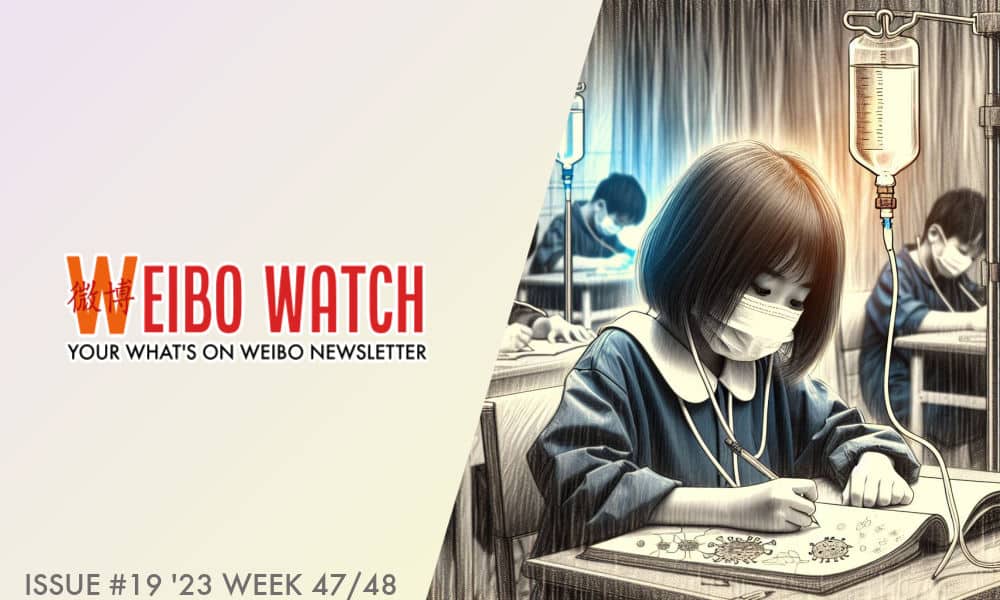
PREMIUM NEWSLETTER | ISSUE #19
This week’s newsletter:
◼︎ 1. Editor’s Note – Homework at hospitals
◼︎ 2. What’s Featured – A closer look at the featured stories
◼︎ 3. What More to Know – Highlighting 8 hot topics
◼︎ 4. What Lies Behind – Observations beyond the headlines, by Miranda Barnes
◼︎ 5. What’s Noteworthy – Much ado about fried eggs
◼︎ 6. What’s Popular – Shaoxing opera draws in a new kind of audience
◼︎ 7. What’s Memorable – One year since the ‘White Paper Protests’
◼︎ 8. Weibo Word of the Week – “Subject Three Dance”, a viral hit
Dear Reader,
‘What is this mysterious illness coming from China?’ ‘I heard Chinese hospitals are filled with kids?’ ‘Are face masks mandatory again?’ ‘Is the Health Code coming back?’ Over the past two weeks, while I was lying in bed with a fever of 39 degrees, I received numerous messages from non-Chinese friends expressing concern about images circulating online showing parents and their sick kids lining up in Chinese hospitals. For some, these scenes evoked memories of the early days of the pandemic and worries about an unknown virus.
While attracting global attention, the recent surge in China’s respiratory illnesses even prompted the World Health Organization to request more information from China about the clusters of pneumonia in children. Chinese health authorities reported no detection of unusual or novel pathogens. This current wave, occurring as China enters its first full winter season since the end of its ‘zero Covid’ restrictions, appears to be a mix of Mycoplasma infections, influenza, Covid-19, Norovirus, and Adenovirus. Coughs, colds, and fevers are notably affecting school-aged children.
A particular image that went viral recently showed Chinese school children doing homework while hooked up to an IV in the hospital. To some on the X platform, the image seemed so bizarre that they questioned its authenticity, suggesting it was fake or AI-generated. The English-language state media outlet SHINE (Shanghai Daily) clarified in one of its recent articles that the image was, in fact, real, and that study areas at some hospital infusion centers have been around since at least 2019.
However, that particular article, titled “AI-generated? Photo of Chinese students doing homework in hospital stirs X debate” was later taken offline and now leads to a 404 page.

Perhaps the disappearance of the article reflects the discomfort surrounding the scenes of Chinese schoolkids doing homework at hospitals. For many, seeing children in hospitals is already disheartening, but the sight of them doing homework in that setting –gasp– is the most dreadful thing they can imagine while also feeding into prejudiced ideas some foreigners may hold about life in China.
One thing I noticed about those messages I received about the images and videos depicting the surge in respiratory illnesses in China is that many people, especially those speaking from a European perspective, assume that children receiving IV fluids at the hospital must be seriously ill. The idea of letting such children do their homework is simply inconceivable.
In reality, it doesn’t necessarily take much to receive IV fluids in many Chinese hospitals or clinics. Unfortunately, part of China’s healthcare culture involves a profit-driven approach that can lead to over-prescriptions, excessive antibiotic use, unnecessary admissions, and the administration of intravenous fluids. Coupled with patients’ preference for hospital-based services and widespread expectations that IV infusions will make them feel better and speed up recovery, it’s not surprising that the practice of administering IV therapy has become routine among Chinese patients, even when their symptoms are mild.
Despite the prevalence of IV use and the many concerned parents who (partly also due to a lack in General Practictioners) are quick to take their sick kids to hospitals and clinics, the image and news articles of children doing their homework in hospitals also triggered discussions on Chinese social media.
The main point of discussion was not that the kids were too ill to do their homework nor that it was bizarre (many people actually praised local hospitals for setting up special study corners); the main focus was how these images embodied the concept of nèijuǎn 内卷, “involution.”
This buzzword has been generating discussions on Chinese social media for years now, and represents the competitive circumstances in academic or professional settings in China where individuals are compelled to overwork because of the standard raised by their peers who appear to be even more hardworking. One popular slogan used by a Chinese cram school showed that this societal rat-race already starts at a very young age: “If you come to us, we will train your kids, if you don’t come to us, we will train the competitors of your kids.”
Chinese clinics and hospitals offering special study rooms or homework corners for kids are actually also part of this ‘rat race.’ One hospital in Nantong, Jiangsu, recently opened up its brand-new study corner in the IV area (输液区一角“学习区”). A spokesperson argued that the hospital does not encourage parents to let their sick kids do homework at the hospital while hooked onto an IV. Still, without such spaces, kids would end up doing homework on floors and in dimly-lit hallways, creating a messy situation and making them even more uncomfortable.

Similarly, schools in Beijing have clarified that students who are ill are not required to finish their homework. Parents have also voiced their opinions, saying they don’t want their kids to do school work when they are ill, but the pressure is simply too much to avoid it.
Much lies behind the image of Chinese kids doing their homework at a hospital, but there’s also a lesson in how quickly people jump to conclusions without understanding the context. While that powerful image is interpreted differently in various contexts, one thing most people seem to agree on is that it’s never a bad idea to take things slow when feeling ill, especially for kids who could use a break.
As I pour myself another hot water with honey and ginger, I hope you also take care of your health during this cold and flu season and remember to take a pause from the everyday rat race, no matter your age or location.
Best,
Manya
What’s Trending

1: The Challenges of an Ordinary Chinese Couple | Two years after they first started sharing their story on Chinese social media, millions of netizens are engrossed in the struggles of the Chinese young parents Li Jun and Liang Liang, whose journey of starting a family and buying an apartment in the city at a time of economic downturn turned into an emotional rollercoaster.
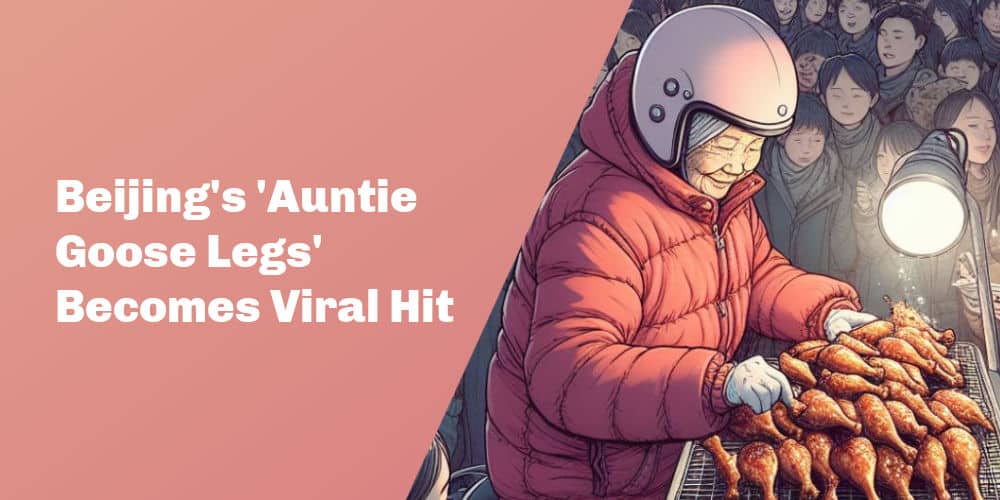
2: Overwhelming Success of a Haidian Food Vendor | A Beijing food vendor, affectionately known as ‘Auntie Goose Legs,’ has become a viral sensation after becoming super popular among the city’s student community. However, this beloved ‘auntie’ has caused quite a commotion recently after relocating her stall, triggering debates among local students over which university she truly ‘belongs’ to.

3: Hu Xijin and Others Discuss Dutch Politics | The Dutch general elections on Tuesday, November 2022, resulted in a victory for the right-wing Freedom Party (PVV). The party, established in 2006, is led by the 60-year-old Dutch politician Geert Wilders who is known for his outspoken populist rhetoric and anti-establishment sentiments. On Chinese social media, the Dutch election outcome became a topic discussed by some well-known bloggers.
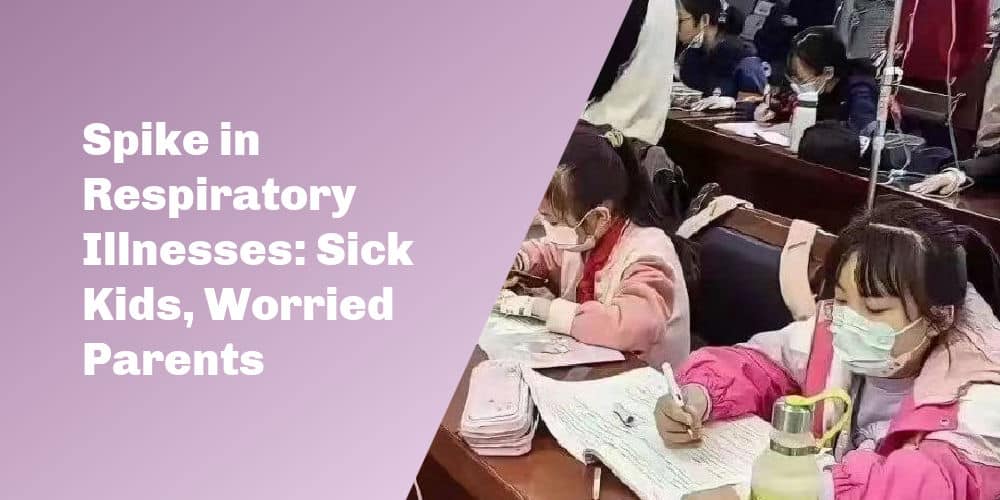
4: Hospitals Flooded during Wave of ‘Flu’ Cases | Recent discussions on Chinese social media platforms have highlighted a notable surge in flu cases. The ongoing flu season is particularly impacting children, with multiple viruses concurrently circulating and contributing to a high incidence of respiratory infections. Among the prevalent respiratory infections affecting children are Mycoplasma pneumoniae infections, influenza, and Adenovirus infection. The spike in flu cases has resulted in overcrowded children’s hospitals in Beijing and other Chinese cities. Parents sometimes have to wait in line for hours to get an appointment or pick up medication.
What More to Know

◼︎ 1. “OLD FRIEND OF CHINA” KISSINGER DIES AGED 100 | The death of the 100-year-old Henry Kissinger made international headlines this week. In China, the former US Secretary of State is mostly remembered as “an old friend” of the country. His lifelong connection to China started in 1971, when he traveled to Beijing for a private meeting with Premier Zhou Enlai to plan the details of the significant and groundbreaking visit by President Nixon, which eventually took place in February 1972. Kissinger would eventually visit China over a 100 times, even after his retirement. His last visit to China took place in July of 2023, when he attended a meeting with President Xi Jinping. This week, Xi sent a condolence message to President Biden and extended sincere condolences to Kissinger’s family. Kissinger’s book On China is still a much-read classic in China.
Besides grieving over the death of Kissinger, Chinese netizens also mourned the loss of another American this week, namely Charlie Munger. The legendary investor, who had many fans in China, died at the age of 99. (Weibo hashtag “Kissinger Passes Away” #基辛格逝世#, 680 million views).
◼︎ 2. GETTING FINED IN SICHUAN’S PUGE | In November, the leaders of a village in Puge, a county in southern Sichuan Province, sparked heated debates by introducing new regulations. According to these rules, local residents could potentially face fines for maintaining a ‘dirty and disordered’ (‘脏乱差’) living environment. Examples of offenses include leaving spider webs in the home, having an untidy bed, or neglecting to do the dishes. The fines range from 3 yuan to 30 yuan ($0.42-$4.20). While some commenters believe that these regulations reflect the village’s attempt to promote cleanliness and order, an online poll revealed that the majority of respondents disagree with the idea of local village leaders imposing fines for personal messiness. (Weibo hastag “Place in Sichuan Gives 10 Yuan Fine for Not Folding Blanket” #四川一地规定不叠被子罚10元#, 140 million views).
◼︎ 3. VISA-FREE CHINA TRAVEL FOR 5 EU COUNTRIES + MALAYSIA | On November 24, China’s Foreign Ministry announced that, starting from December 1st 2023, individuals holding ordinary passports from France, Germany, Italy, the Netherlands, Spain, and Malaysia can enjoy visa-free entry to China for business, tourism, family visits, and transit, as long as their stay does not exceed 15 days. This initiative, which aligns with China’s broader efforts to boost tourism and promote international exchanges, will continue until November 30, 2024. On Weibo, many netizens expressed disappointment that the visa-free travel regulation was unilateral; Chinese travelers still need a visa to enter these countries. (Weibo hashtag “China Tries Out Visa-Free Policy for France, Germany, Netherlands, Italy, Spain, and Malaysia” #中方将对法德意荷西马六国试行免签政策#, 110 million views.)
◼︎ 4. CIVIL SERVANTS EXAMS | The yearly national public servant exams in China began last Sunday. With over 3 million candidates, this year marks a historically high number of candidates who are vying for the available 39,600 job openings in central government agencies and affiliated institutions – twice the amount of positions that were available in 2019. (Weibo hashtag “Average of 77 People Competing for One Position for 2024 National Exam” #2024国考平均约77人竞争一岗位#, 34 million views).
◼︎ 5. PINDUODUO’S 11-11-6 WORK SCHEDULE | As news circulated on November 29 that Pinduoduo, the Chinese online retailer, was on the verge of surpassing Alibaba as China’s most valuable e-commerce firm (spoiler: Alibaba remained the largest by day’s end), discussions about the company’s demanding work schedule gained traction on Weibo. According to insiders, employees are required to follow an “11-11-6” work system: start work at 11:00 a.m., get off at 11:00 p.m., and work six days a week. Sometimes they allegedly also work overtime until the early hours of the morning, making 70-hour work weeks. The harsh work culture at Pinduoduo already triggered national debates in 2021 after the sudden death of a 22-year-old female employee. (Weibo hashtag “Pinduoduo Work System” ##拼多多 工作制##, 50.9 million views).
◼︎ 6. COTTI COFFEE GOES TEA CAT | Cotti Coffee (库迪咖啡), founded by Charles Lu and Jenny Qian, former Luckin Coffee executives who departed in 2020, has expanded to over 5,000 locations across more than 300 cities in five countries. The brand gained attention last week with the announcement of its entry into the tea market. Starting from January 2024, Cotti is set to unveil its Milk Tea brand “Tea Cat” (茶猫), which is now in its pilot store testing phase. Given Cotti’s remarkable growth over the past 2 years, we can anticipate a surge in the number of ‘Tea Cat’ outlets in Chinese cities in the near future. (Weibo hashtag “Cotti Coffee Marches into the Tea [Industry]” #库迪咖啡进军奶茶#, 42,5 million views).
◼︎ 7. CHINESE BILLIONAIRE BUSINESSMAN REUNITED WITH SON | On December 1st, Jie Kefeng (解克锋), a wealthy Chinese entrepreneur from Hebei who had offered a million yuan reward to find his missing son, Jie Qingshuai (解清帅), finally reunited with him after 25 years. Jie Kefeng and his wife held a thank-you banquet on December 2nd, which attracted considerable attention online. Jie Qingshuai, the couple’s second son, was abducted in 1998 when his mother left him at home to run a quick errand. The couple never gave up on finding their son and finally, through the help of anti-child trafficking authorities and technology, they found their son, who was sold by human traffickers as a child. The people responsible for his kidnapping have since been arrested. (Weibo hashtag: “Billionaire Family Throws 26th Birthday Party for Abducted Son” #亿万富翁全家为被拐儿子补过26岁生日#, 32.2 million views).
◼︎ 8. YANG MING’S LOVE STRUGGLES | The renowned Chinese basketball player and head coach of the Liaoning Flying Leopards, Yang Ming (杨鸣), took center stage on Chinese social media this week due to rumors about his divorce from his wife Tang Jialiang, with whom he has two children. Despite Yang Ming being a prominent figure in the sports realm rather than in the Chinese entertainment circle, the private aspects of his life, particularly his romantic relationships, continue to captivate netizens who have been following the gossip surrounding the handsome coach for years. This heightened interest is fueled by past speculations of Yang Ming being involved with a female college student. His current romantic interest supposedly is a 45-year-old music teacher. (Weibo hashtag “Exposed: Yang Ming Divorced” ##杨鸣被曝离婚##, 430 million views).
What Lies Behind
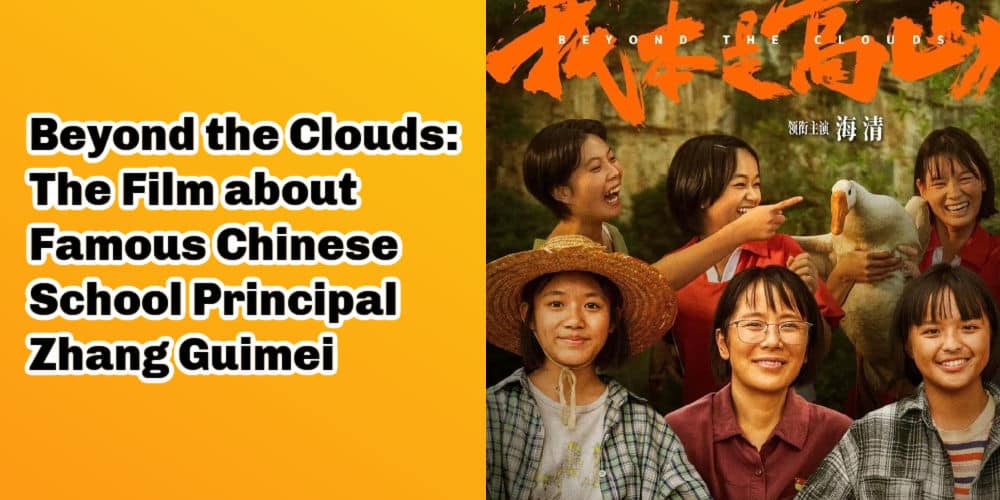
Discussions over ‘True Feminism’
Beyond the Clouds (我本是高山) is a biographical film that premiered in China on November 24. Directed by Zheng Dasheng (郑大圣) and Yang Jin (杨锦), the film portrays the life of Zhang Guimei (张桂梅, 1957), a nationally renowned female principal who manages a girls’ school in the impoverished Huaping County, Lijiang, Yunnan province.
As a teacher in Huaping County, Zhang noticed many girls dropping out of school, forced into marriage or work. In many underprivileged areas of China, where sons are often favored over daughters, girls’ education takes a hit when finances are tight. Driven by her commitment to the higher Communist cause and the belief in the pivotal role of female education in shaping the nation’s future, Zhang established the first free girls’ school in China in 2008 with the help of donations. Over the past 15 years, this school has sent over 2000 girls to universities, setting them on diverse career paths.
Over the past decade, Zhang Guimei’s selfless work has been praised by the people and recognised by the authorities. In 2021, she even received a medal from Xi Jinping for her lifelong dedication to girls’ education in rural China, precisely where women’s emancipation is most crucial. Despite her popularity as a feminist championing girls’ education in China, the film has faced criticism for distorting elements of her story.
For instance, the film portrayed Zhang’s motivation to sustain the school as a personal response to mourning her husband’s early death. Feminist supporters of Zhang argue that this narrative transforms her commitment to a higher cause into a personal and romantic motive: ‘Can’t she just be doing this because she believes in the importance of female power? Why does everything have to be motivated by a man?’ they challenged.
Another point of discussion is how the film portrays female students skipping school to go shopping or hang out at internet cafes. Many commenters argued that this is far from the reality, “do you know how much these girls value their opportunity to continue school? Why do you portray them like that?” Another reason why some argued the movie was actually not supporting the feminist cause is how it changed a real story relating to an abusive alcoholic father into one about an alcoholic mother instead. Outraged, some fans of Zhang’s work see these kinds of seemingly trivial changes as an attack on Chinese women, going against the nature of Zhang’s lifework.
Although Chinese state media is promoting Beyond the Clouds through online platforms and news articles, the voices criticizing the adaptation will not be silenced. While official channels mostly emphasize how Zhang is a true communist, many of her fans mostly see her as a true feminist – and they vehemently resist any attempts to frame Zhang or her story within a patriarchal narrative.
What’s Noteworthy
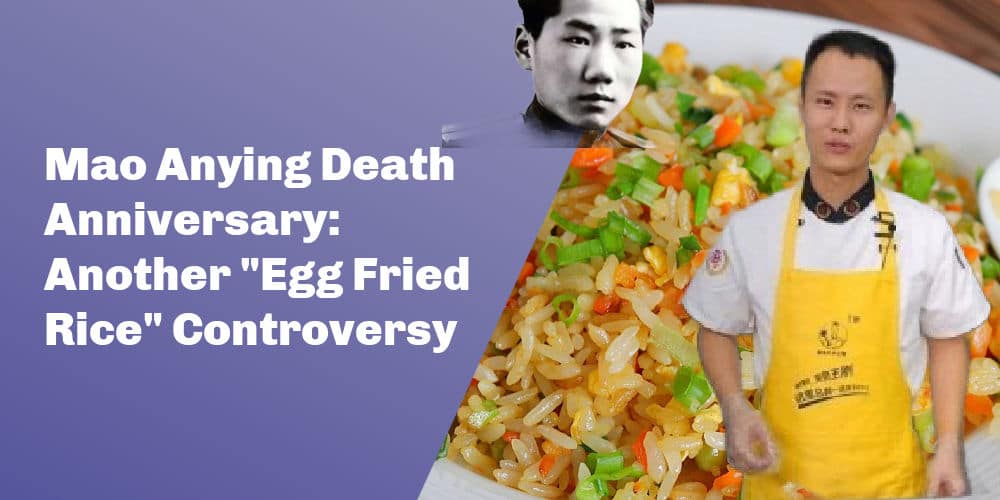
Much Ado About Fried Eggs
Mao Anying, Chinese military officer and the son of Mao Zedong, died on November 25 in 1950. Every year, there are some sensitivities surrounding this date because of fried egg rice. One part of Mao Anying’s death that has become an ongoing, urban-legend-kind-of online story is that he supposedly disobeyed army rules and cooked egg fried rice at the Chinese headquarters in the North Korean battlefield. The smoke of the fire supposedly alerted the enemy and led to the bombing in which he would lose his life. The anniversary of Mao Anying’s death has therefore come to be mocked and celebrated by some netizens as “Egg Fried Rice Day” (蛋炒饭节) or “Chinese Thanksgiving” (中国感恩节), since it’s close to the American Thanksgiving.
A few years ago, the sensitive nature of this meme became clear when Chinese celebrity chef Wang Gang (王刚), with many social media followers, uploaded a video on how to prepare Yangzhou-style fried rice. As described by Dennis E. Yi (2020), the chef was accused of “humiliating China” due to the alleged – and perhaps unintentional – connection to Mao Anying.
This year, Wang Gang once again found himself apologizing for sharing an egg fried rice tutorial around the anniversary of Mao Anying’s death, sparking allegations of disrespect towards Mao Zedong’s son. As this marked the third instance of Wang Gang facing backlash over fried rice, he has now pledged to refrain from making egg fried rice in the future (“作为厨子,以后再也不做炒饭”). Relevant hashtag pages have since been removed from Weibo.
If you want to know more about a renewed focus on Mao Anying in Chinese online media, where official voices communicate why – and in which way – Mao Anying needs to be remembered by the Chinese people, do read this feature article we published in 2022.
What’s Popular

Why Shaoxing Opera is Popular Among Chinese Youth
Yue opera (越剧), also known as Shaoxing opera, is a Chinese opera genre that originated in Zhejiang Province and is particularly popular in Shanghai. Although Chinese opera is generally mostly loved by China’s older generations, new adaptations of classic plays or films featuring a fresh generation of opera performers have now also generated a buzz among China’s younger audiences.
Recently, it’s Yue opera New Dragon Gate Inn (新龙门客栈) that has gone viral, featuring six actresses (they also play the roles of men) of the Zhejiang Xiaobaihua (小百花) troupe. The play is actually an adaptation of the 1992 martial arts film. One actress in particular has become popular online for her cross-gender acting (女扮男装), namely Chen Lijun (陈丽君), who plays the role of Jia Ting. She joined the Xiaobaihua troupe in 2013, right after her graduation.
The online succes of this show (and other ones, including Butterfly Lovers 梁祝) and their performers has led to a run on opera tickets and has cultivated a new kind of theater audience. New Dragon Gate Inn is performed at the Butterfly studio theater in Hangzhou (杭州蝴蝶剧场) and uses immersive theater styles to break away from traditional forms of opera performance. If you want to grab a ticket, you’ll have to really try since you’ll join thousands of others who are eagerly waiting to attend one of the shows in real life.
What’s Memorable

One Year Since White Paper Protests
Exactly one year ago, news of protest movements popping up in various cities across China went buzzing around the internet. After enduring months of stringent Covid measures, students in Nanjing and Xi’an gathered around campus and held up blank paper sheets in protest of censorship. Their white papers said what could not be expressed, and so the movement was soon dubbed the “white paper protest” or the “A4 Revolution.”
Unrest and protests happened from Urumqi to Nanjing, from Beijing to Shanghai. People sang the ‘Farewell’ song (送别) to commemorate those who died in the tragic 11.24 Urumqi fire and who spent the last 100 days of their lives in lockdown. Online, people used various hashtags and posted clips of ‘Do you Hear the People Sing’ from Les Misérables.
But while news of the protests made global headlines, the terms “outside forces” or “external forces” (外部势力) increasingly popped up in Chinese social media discussions. Boosted by nationalistic bloggers, the idea that foreign forces were meddling in China’s affairs became more prevalent as a way to explain the sudden wave of protests . Read more in this newsletter’s pick from our archive below.
Weibo Word of the Week
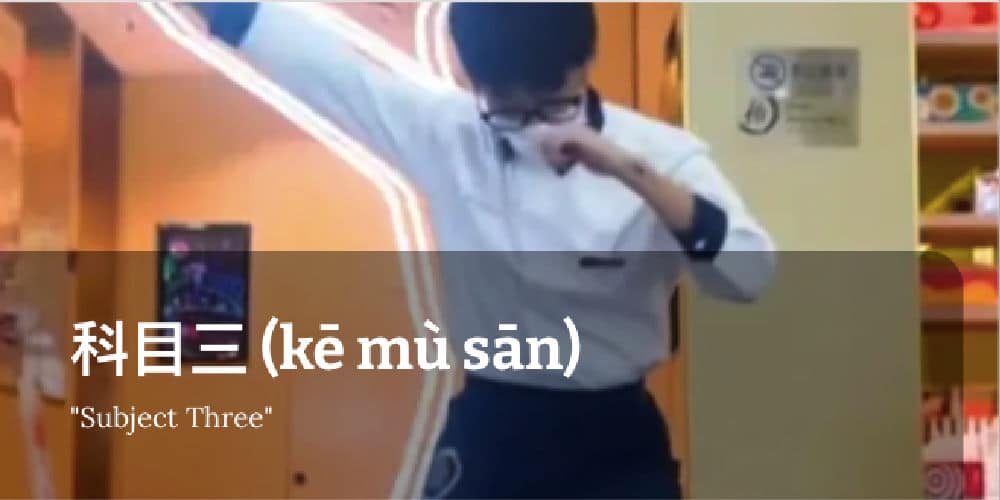
“Subject Three” | Our Weibo Word of the Week is “Subject Three” (kē mù sān 科目三).
Recently, ‘Subject Three’ has become a buzzword on Chinese social media in connection with a viral dance, the Subject Three Dance (科目三舞蹈). From Douyin to Bilibili, the dance is super popular online and is performed by various people, from online influencers to virtual vloggers. The dance has become especially big since the renowned Chinese hotpot chain, Haidilao, allowed its staff to perform this viral dance for diners upon request, leading to amusing and occasionally awkward situations. On November 28, one customer even turned violent when he found the Subject Three performance at a local Huai’an restaurant too noisy and annoying.
The term ‘Subject Three’ allegedly first gained traction in 2022 or early 2023 following a video showcasing the jubilant atmosphere of a Guangxi wedding. Subsequently, ‘Guangxi Subject Three’ (广西科目三) became a popular reference, originating from a humorous joke. Although traditionally associated with the third part of a driver’s license exam, people playfully suggested that Guangxi locals undergo three significant “exams” in their lifetime: one for singing folk songs, one for mastering the art of slurping rice noodles, and the third for dancing (“广西人一生中会经历三场考试,科目一唱山歌,科目二嗦米粉,科目三跳舞”).
By now, the dance has transcended its original context of Guangxi weddings and Haidilao staff dances, as it’s turned into a true social media hype where people create and share videos of themselves and others performing the Subject Three Dance, which is characterized by playful and exaggerated movements accompanied by the background music of “江湖一笑” (Jianghu Smile), making it entertaining, humorous, and, most of all, meme-worthy.
This is an on-site version of the Weibo Watch newsletter by What’s on Weibo. Missed last week’s newsletter? Find it here. If you are already subscribed to What’s on Weibo but are not yet receiving this newsletter in your inbox, please contact us directly to let us know.
Stories that are authored by the What's on Weibo Team are the stories that multiple authors contributed to. Please check the names at the end of the articles to see who the authors are.

Newsletter
Weibo Watch: The Future is Here
The future is here, but it looks different than we expected. This Weibo Watch covers driverless taxis and other noteworthy, popular topics.
Published
4 days agoon
July 23, 2024
PREMIUM NEWSLETTER | ISSUE #33
This week’s newsletter:
◼︎ 1. Editor’s Note – The future is here
◼︎ 2. What’s New and Noteworthy – A closer look at the featured stories
◼︎ 3. What’s Trending – Hot highlights
◼︎ 4. What’s Remarkable – A panicked mum goes to extremes
◼︎ 6. What’s Popular – The passing of Cheng Peipei
◼︎ 7. What’s Memorable – Virtual news anchors
◼︎ 8. Weibo Word of the Week – Bye bye, Biden
Dear Reader,
The future is here, and it is all unfolding so much differently than we could have imagined.
Scrolling through Douyin and Weibo’s video feeds recently, there are hundreds of videos about China’s self-driving taxi revolution. The wonder and excitement over the unmanned cabs is not surprising – it is the biggest thing happening in China’s taxi industry since ride-hailing apps Didi, Kuaidi, and Uber first entered the Chinese market over a decade ago.
Luobo Kuaipao (萝卜快跑) by Baidu, called ‘Apollo Go’ in English, is the ‘robotaxi’ ride-hailing platform that is now generating the most attention online. The concept is simple: customers order the taxi via the app and enter their destination, it arrives at the meeting point, and via a panel on the side of the car, the customer inserts the last four digits of their phone number. The door then automatically opens, and they can get in the car, which will take them to where they want to go. The car is private, and the price is comparable to ride-sharing fees, but then cheaper.
There is an additional benefit: the cars are equipped with a “smart cockpit”, allowing passengers to start their journey by tapping the screen in front of them, selecting a podcast or their favorite music, controlling the air-conditioning, and watching the traffic while en route.
Currently, Luobo Kuaipao has some 500 robotaxis operating without safety drivers in Wuhan, now the world’s largest city for driverless taxis. Baidu plans to expand this fleet with an additional 1,000 robotaxis soon. Shanghai will also launch a public testing program for driverless taxi services by SAIC in the upcoming week.1
Across China, at least 16 cities are now testing self-driving vehicles, with at least 19 Chinese car manufacturers competing for global leadership. Nationwide, 20 provinces have already released policies and regulations for autonomous driving.23
In many bigger Chinese cities, smart autonomous vehicles are already part of daily life. For years now, autonomous cleaning cars have been a common sight in popular tourist spots. I remember seeing a cute little car working hard to clean the area around the Terracotta Warrior museum in Xi’an in 2019. There are also self-driving tourist shuttles, driverless trucks operating between Beijing and Tianjin, and AI-driven service carts that precisely know where crowds gather during lunch breaks, stop when people wave, and process mobile payments for hamburgers or chicken salads on the spot.
So far, so ‘futuristic.’
But it’s not all roses. Besides the many enthusiastic videos taken by Chinese riders posting their experiences of taking an unmanned, self-driving taxi for the very first time, the emergence and rising popularity of robotaxis is also leading to worries, complaints, and aggravation.
A commonly heard objection to the unmanned taxis is that they are taking away jobs in the taxi industry. Perhaps even more so than when ChatGPT first emerged, the question of AI replacing people rather than serving them is frequently popping up, with taxi drivers fearing they’ll lose their jobs as robotaxis spread throughout China. These worries can still be countered by the numbers. After all, Wuhan has more than 100,000 registered ride-hailing cars, and Luobo Kuaipao holds just around 0.40% of the market – an insignificant number. 4 But with the rise of the industry, including its competitive prices, that number is bound to change.
Another far more unexpected concern about the rise of China’s robotaxis is that they’re causing chaos in the streets by being ‘too polite.’ These autonomous taxis are trained to follow the traffic rules and act civilized in traffic – something that seems out of place in some areas, where not following the rules almost seems like a rule.
By staying in the right lane, stopping for red lights, and giving priority to other cars, pedestrians, and animals, Chinese robotaxis are causing road congestion and sometimes accidents. They often struggle with complex traffic situations; for example, a viral video showed two Luobo Kuaipao cars waiting for each other to move, holding up traffic. In Wuhan, where drivers are known for their aggressive driving style, these autonomous cars face additional challenges. They strictly follow traffic laws and are not accustomed to pushing their way into traffic, which can lead to long waits for simple turns or merges, causing delays for other drivers.
This behavior has earned them the nickname ‘Sháo Luóbo’ (勺萝卜, “silly radish”), suggesting they are sluggish, or dumb. Although Luobo Kuaipao translates to ‘Radish Runs Fast’ or ‘Carrot Run,’ implying speed and efficiency, the reality is quite different.
Also unexpected is how ‘driverless’ is not what you might have thought it is; because every car still has a “safety operator” who is remotely monitoring it from another location. One person can monitor 10 cars or even more, but they’re allegedly penalized if they close their eyes for more than three seconds.5 Videos and pictures from these robotaxi headquarters sometimes look like old-fashioned game halls or internet cafes.
Complaints about Luobo Kuaipao not being as modern as people hoped and not being as assertive as they thought ultimately boil down to a clash of cultures. Luobo Kuaipao is made in China, but it’s not programmed with the personality and ways of a Wuhan taxi driver. In the end, Wuhan drivers will need to learn from Luobo Kuaipao, and Luobo Kuaipao will need to learn from Wuhan traffic. One side will learn to become more ‘polite,’ while the other will need to add some ‘aggression’ in order to mix in with traffic.
As ‘silly’ as Luobo Kuaipao may seem now, let’s not forget that everything starts small – we all began in diapers. Nothing significant ever came without humble beginnings. The future is here, but what we consider truly ‘futuristic’ will perhaps always be a vision for the days to come.
Miranda Barnes and Ruixin Zhang have contributed to the compilation and interpretation of some topics featured in this week’s newsletter. As always, if you have any observations or ideas you’d like to share, please don’t hesitate to reach out to me.
Best,
Manya Koetse
(@manyapan)
References:
1 Wu Qingqing 吴青青. 2024. “The Luobo Kuaipao Versus Tesla War”[萝卜快跑,与特斯拉终有一战].” Auto Business Review (汽车商业评论), July 18 https://inabr.com/news/19693 [Accessed July 22, 2024].
2 Bradsher, Keith. 2014. “China Is Testing More Driverless Cars Than Any Other Country.” New York Times, June 14 https://www.nytimes.com/2024/06/13/business/china-driverless-cars.html [Accessed July 22, 2024].
3 Qi Xu 齐旭. 2024. “Which City is China’s First City for Autonomous Driving? [谁是中国自动驾驶“第一城”?]” China Electronics News 中国电子报, July 16 https://new.qq.com/rain/a/20240716A00W2N00?suid=&media_id= [Accessed July 22, 2024].
4 Wu Qingqing 吴青青. “The Luobo Kuaipao Versus Tesla War.”
5 Jones, Phil. 2014. “Behind Driverless Cars – The Safety Operators Who Can’t Close Their Eyes[无人驾驶车背后,是无法闭眼的安全员].” The Paper, July 19 https://m.thepaper.cn/newsDetail_forward_28124126 [Accessed July 22, 2024].
What’s New

“As smooth as a flying bullet” | The assassination attempt on former US President Trump at a Pennsylvania campaign event also became a major topic on Chinese social media, where Trump’s swift reaction and defiant gesture after the shooting have not only sparked discussions but also fueled the “Comrade Trump” meme machine.

Park with a view | “The ‘sea in Ditan Park’ is a perfect example of how Xiaohongshu netizens use their imagination to change the world,” a recent viral post on Weibo said. This seaview spot in the Beijing public park has become a new ‘check-in spot’ among Chinese Xiaohongshu users and influencers.

From Hollywood to Beijing | For the Dutch national broadcaster’s summer series ‘From Hollywood to Bollywood,’ I spoke about the Chinese blockbuster Battle at Lake Changjin (2021) this week. This spectacular war film depicts the story of Chinese troops during the massive Battle of the Chosin Reservoir in the Korean War, where they encircled and pushed back American forces. The film is an impressive visual spectacle, but it’s a landmark movie in other aspects as well. Under the leadership of President Xi Jinping, China is striving to become a global powerhouse in the film industry. At the same time, this film also helped shape new narratives of the Korean War that foster patriotism. Dutch readers can listen to or watch the entire conversation via the link. If you’re interested in learning more about this topic but not that good at understanding Dutch—nobody’s blaming you—check out this article on WoW from our archive.
What’s Trending
JULY 11
🛢️🍳 Cooking Oil Scandal | A major news topic that’s been fermenting over the past month is the revelation that some cooking oil transport trucks in China are also being used for transporting industrial oil. The issue went trending after a publication by Beijing News authored by investigative journalist Han Futao (韩福涛) on July 2, which detailed how the same tanks were used for transporting both edible oils like soybean oil and chemical oils like kerosene without any cleaning process. The food safety scandal sparked outrage online and led to people meticulously tracking the whereabouts of oil tankers and how they operate, while various tanker companies came forward to provide clarity on their procedures. The incident has raised significant awareness about the potential misuse of tankers and intensified concerns about food safety in China.
JULY 15
🚗 Trump Photo Copyrights | After the Trump rally shooting went viral across Chinese media, another trending hashtag emerged regarding the copyright of the iconic ‘raised fist photo,’ shot by award-winning photographer Evan Vucci. Chinese online sources attributed the photo’s rights to the photo agency “Visual China” (视觉中国), allegedly charging 2100 yuan ($288) per use on social media, with threats of lawsuits for unauthorized use. This sparked debates over copyright ownership, as Evan Vucci was not mentioned. In the past, the same company triggered controversy for claiming copyright for an image of the Chinese national flag. They were also sued by a Chinese photographer for claiming ownership of 173 of his photos. Visual China later clarified that they, as a partner of AP, only have distribution rights but do not own the Trump photo.
JULY 16
🌧️ Floods | Thousands of households across China have been affected by floods recently, from Sichuan to Hunan, from Henan to Shaanxi. The city of Xiangyang in Hubei is one such affected area, which experienced its strongest rainfall since the start of the flood season. Some areas nearby broke single day rainfall records, with cars in the streets being swept away by the water. In Henan, floods forced over 100,000 people to evacuate their homes, according to state media. The floods have been catastrophic, especially for farmers, leaving widespread devastation.
JULY 19
🏥 Wenzhou Doctor Killed | A vicious attack on a doctor at the First Affiliated Hospital of Wenzhou Medical University has gone viral this week, sending shockwaves across Chinese social media. The incident occurred on the afternoon of July 19, when a man suddenly attacked and stabbed Dr. Li Sheng (李晟), who was on duty in the hospital’s cardiology department. The attacker subsequently jumped off the building. Despite extensive rescue efforts, Li succumbed to his injuries that night. The incident has sparked outrage, particularly in light of several recent stabbing incidents and the ongoing issue of patient-doctor violence, leading many netizens to call for improved security measures in hospitals. Tributes to Dr. Li Sheng online describe him as a man fully dedicated to his work and patients. China’s National Health Commission condemned the attack, stating there is zero tolerance for any form of violence against medical personnel.
JULY 20
🌉 Collapsed Bridge | After heavy rain and flash floods, a highway bridge that had been in use for less than six years in Shangluo, Shaanxi Province, collapsed on July 19th, causing 25 vehicles to fall into the river. While rescue efforts were still underway, the incident has resulted in 12 known deaths and 31 missing. The past weekend, two missing vehicles were found downstream, 4 kilometers from the collapse site. More than 700 professionals from various emergency services, along with over 1,500 local officials and residents, have been mobilized for search and rescue operations.
JULY 17
🔥🚒 Shopping Mall Fire | Videos of a terrible fire at the 14-story Jiuding Department Store in Zigong, Sichuan, spread on Chinese social media on Wednesday night. Initially, the death toll stood at 8, but it later emerged that at least 16 people lost their lives in the flames despite extensive rescue efforts by firefighters. Thirty-nine people were hospitalized. The fire, now known as the “7·17 major fire accident” (“7·17重大火灾事故”), is suspected to be linked to ongoing construction work.
JULY 21
🏅🧳 Olympic Suitcase Fever | Just a few days before the start of the Olympic Games in Paris, and the Olympic fever is noticeable on Chinese social media. Chinese state media have issued phone wallpaper featuring Olympic athletes. However, what recently attracted the most attention are the suitcases used by Chinese athletes traveling to Paris. These suitcases, called “Ying Yong” (英俑), were designed exclusively for the Chinese sports delegation by a company in Hangzhou. The design is themed around the Terracotta Warriors, using red and black and featuring other details inspired by the Terracotta Army.

JULY 22
🏫 Professor Mi | A story about renowned Chinese professor Wang Guiyan (王贵元) has been blowing up on Chinese social media after he was accused of sexual misconduct by a former female doctoral student. She made these allegations through an online video against the professor, who also served as the Party Secretary and Vice Dean of the School of Liberal Arts at Renmin University of China. On July 22, the university responded to the allegations and stated that their investigations found them to be true. As a result, Wang has been expelled from the Party, his professorship has been revoked, his qualification as a graduate supervisor has been canceled, he has been removed from his teaching position at Renmin University, and his employment has been terminated.🔚
What’s Noteworthy

A mother who lost her child while shopping in a mall in Shiyan, Hubei, went to extreme measures to get her child back as soon as possible. On July 19, the panicked woman triggered the mall alarm by smashing the displays at a jewelry store with a fire extinguisher. This caused the mall to shut all its doors and prompted a police squad to arrive within minutes. A viral video of the incident showed the mother shouting for help as she broke glass displays. The child was soon located.
In the past, there have been various stories about children being kidnapped and having their appearances changed quickly, making it much more challenging to find them. One such story from 2018 showed the speed at which human traffickers work: a 5-year-old girl went missing from a local playground at 14:41, and it later became clear that the little girl, taken away in a minivan with a middle-aged woman and another child, departed her city by train just fifteen minutes later. She got off at a station some 60 miles away with changed clothes and a shaved head (read here).
Although the mother may have thought she did the right thing by smashing the displays to get help to locate her child as soon as possible, she is also receiving a lot of criticism online. Commenters argue that the woman should have never lost sight of her child in the first place, let alone vandalized mall property. The jewelry store also had nothing to do with the child going missing. The local police stated that the woman’s actions would be handled according to public security regulations, so she can expect to pay a fine and compensation to the store.
Meanwhile, there are also people who sympathize with the mother, as they don’t want to imagine what could have happened to the child if standard, slower procedures were followed. However, state media outlets warn others not to take the woman as an example.
What’s Popular

She was known as the heroine and villain of Wuxia movies, the queen of the swords, and a martial arts diva. Hong Kong actress Cheng Pei-pei (郑佩佩) trended all day on Chinese social media after news broke that she had died at the age of 78.
The Shanghai-born Cheng had a background in ballet and modern dance—skills she incorporated into the fight choreographies of the martial arts films she made for the Shaw Brothers in the 1960s and 70s. She later moved to the United States. Cheng gained international fame when she starred as Jade Fox in Ang Lee’s “Crouching Tiger, Hidden Dragon” in 2000. Cheng suffered from Corticobasal degeneration (CBD), which shares some similarities with Parkinson’s disease.
On social media, Cheng is remembered not only by other actors and celebrities but also by many regular netizens who see her passing as a major loss to the Chinese film industry. (To read more about the Shaw Brothers & Chinese cinema, check our article here.)
What’s Memorable

For this pick from the archive, and in the context of the future being here, we revisit a 2023 article about Chinese state media introducing a virtual news anchor. While the first virtual presenter was introduced in 2019, People’s Daily introduced Ren Xiaorong (任小融) as a virtual presenter/news anchor in 2023. Although virtual news presenters are not yet the norm, this is a trend that is still developing. For example, this week, China’s Military News Agency also launched their virtual anchor to improve communication efficiency.
Weibo Word of the Week

Bye Bye Biden | Our Weibo phrase of the week is Bye Bye Biden (bài bài Bàidēng 拜拜拜登).
As news of Biden dropping out of the presidential race went viral on Weibo early Monday local time, it’s time to reflect on some of the popular nicknames and phrases given to US President Joe Biden on Chinese social media.
🔹 Biden in Chinese: Bàidēng 拜登
Biden in Chinese is generally written pronounced and written as Bàidēng 拜登. Although the character 拜 (bài) means “to pay respect, to worship” and 登 (dēng) means “to ascend, to climb,” they’re used here primarily for their phonetic similarity. The characters chosen are neutral to avoid any negative implications in the official translation of Biden’s name.
Why are non-Chinese names translated into Chinese at all? With English and Chinese being vastly different languages with entirely different phonetics and scripts, most Chinese people find it difficult to pronounce a foreign name written in English. Writing foreign names in Chinese not only standardizes them but also makes pronunciation and memorization easier for Chinese speakers.
🔹 Bye Biden: Bài Bài Bàidēng 拜拜拜登
Because Biden is Bàidēng, and the Chinese for ‘bye bye’ is written as bài bài 拜拜, some netizens quickly created the wordplay “bài bài Bàidēng” 拜拜拜登 (“bye bye Biden”) upon hearing that Biden would not seek reelection. Try saying it out loud—it almost sounds like you’re stammering.
🔹 Old Joe: Lǎo Dēng Dēng 老登登
Another common farewell greeting to Biden seen online is “bài bài lǎo dēng dēng” 拜拜老登登, which sounds cute due to the repetition of sounds.
“Old Biden” or “lǎo dēng dēng” 老登登 is a common online nickname for Biden in Chinese. The reduplication of the 登 (dēng) makes it sound playful and affectionate, while the “old” prefix is commonly used when referring to someone older. It’s similar to calling someone “Old Joe” in English.
🔹 Biden Variations: 拜灯, 白等, 败蹬
Let’s look at some other ways Biden is nicknamed online:
Besides the official way of writing Biden with the 拜登 Bàidēng characters, there are also other variations:
拜灯: bài dēng
白等: bái děng
败蹬: bài dèng
These alternative ways of writing Biden’s name are not neutral. Although the first variation is not necessarily negative (using the formal Biden 拜 bài character but with ‘Light’ 灯 dēng instead of the other 登 ‘dēng’), the other two variations are usually used in more negative contexts.
In 白等 (bái děng), the first character 白 (bái) means “white,” which can evoke associations with old age due to white hair (白发). The character 等 (děng) means “to wait,” and the combination can imply being old and sluggish.
败蹬 (bài dèng) is typically used by netizens to reflect negative sentiments towards the American president. The characters separately mean 败 (bài): “to be defeated,” “to fail,” and 蹬 (dèng): “to step on,” “to kick.” This would never be used by official media and is also often used by netizens to circumvent censorship around a Biden-related topic.
🔹 Revive the Country Biden: Bài Zhènhuá 拜振华
Then there is 拜振华 Bài Zhènhuá: revive the country Biden
In recent years, Biden has come to be referred to with the Chinese nickname “Revive the Country Biden,” also translatable as ‘Thriving China Biden’. This nickname has circulated online since 2020 and matches one previously given to former President Trump, namely “Build the Country Trump” (Chuān Jiànguó 川建国).
The idea behind these humorous monikers is that both Trump and Biden are seen as benefitting China by doing a poor job in running the United States and dealing with China.
🔹 Sleepy King: Shuì wáng 睡王
Shuì wáng 睡王, Sleepy King, is another common nickname, similar to the English “Sleepy Joe.” During and after the 2020 American presidential elections, there were numerous discussions on Chinese social media about ‘Trump versus Biden.’ Many saw it as a contest between the ‘King of Knowing’ (懂王) and the ‘Sleepy King’ (睡王).
These nicknames were attributed to Trump, who frequently boasted about his unparalleled understanding of various matters, and Biden, who gained notoriety for being older and tired. Viral videos, some manipulated, showed him nodding off or seemingly disoriented. The name ‘Sleepy King’ then stuck.
🔹 Grandpa Biden: Bài Yéyé 拜爷爷
Throughout the years, Biden has also been nicknamed Bài yéyé 拜爷爷, “Grandpa Biden.” This is usually more affectionate, though it emphasizes his age—Trump is not much younger than Biden and is not nicknamed ‘Grandpa Trump.’
Another similar nickname is lǎo bái 老白, “Old White,” referring to Biden’s age and white hair. 白 (bái, white) can also be a surname in Chinese. This nickname makes it seem like Biden is an old, familiar friend.
On Weibo, many speculate that American Vice President Kamala Harris will be the new candidate for the Democrats, especially since she’s been endorsed by Biden. Many have little confidence that she can compete against Trump. Her Chinese name is Kǎmǎlā Hālǐsī 卡玛拉·哈里斯, commonly referred to as ‘Harris’ (Hālǐsī).
In light of the latest developments, some netizens jokingly write: “Bye bye Biden, Ha ha ha, Harris.” (Bài bài, Bàidēng. Hā hā hā, Hālǐsī 拜拜,拜登。 哈哈哈,哈里斯). With a new Democratic candidate entering the presidential race, we can expect a fresh batch of creative nicknames to join the mix on Chinese social media.
Want to read more? Also read: Why Trump has Two Different Names in Chinese.
This is an on-site version of the Weibo Watch newsletter by What’s on Weibo. Missed last week’s newsletter? Find it here. If you are already subscribed to What’s on Weibo but are not yet receiving this newsletter in your inbox, please contact us directly to let us know.
China Memes & Viral
Weibo Watch: Get Up, Stand Up
This week, Chinese netizens discussed subway seat confrontations, a shocking public stabbing, and Hu Youping’s heroism. Also: more trending topics, from hallucinogenic mushrooms to traveling pandas and reactions to the Biden vs. Trump debate.
Published
3 weeks agoon
July 7, 2024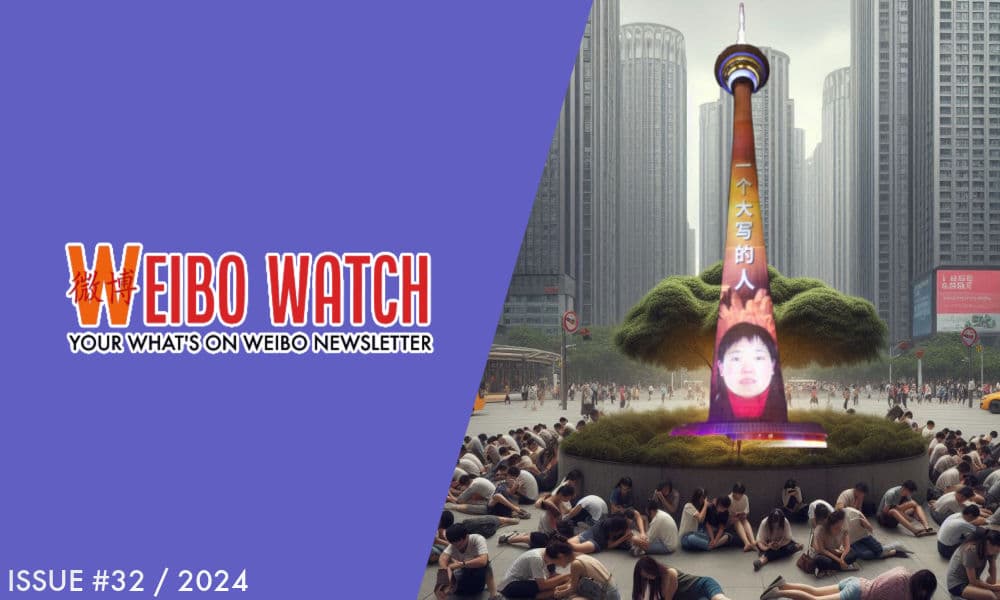
PREMIUM NEWSLETTER | ISSUE #32
This week’s newsletter:
◼︎ 1. Editor’s Note – Get up, stand up
◼︎ 2. What’s New and Noteworthy – A closer look at the featured stories
◼︎ 3. What’s Trending – Hot highlights
◼︎ 4. What’s Remarkable – Seeing little people
◼︎ 6. What’s Popular – Wild Child: missing in action
◼︎ 7. What’s Memorable – Bystander effect
◼︎ 8. Weibo Word of the Week – “City bu City”
Dear Reader,
Over the past few weeks, there has been a lot of discussion on Chinese social media about young people refusing to give up their seats for older people on the subway, sometimes leading to explosive situations.
On June 16, security was called when a young man on a Shenyang subway crumbled after an old man demanded that he’d give up his seat for him. In a video of the incident, which soon went viral, the young man can be heard screaming: “Are you giving me money? No? Then don’t bother me! I’m just happy to be sitting here. What’s wrong with me grabbing a seat?
Another subway incident went trending a week later. On June 24, a 65-year-old man started harassing a young woman on Beijing Subway Line 10 after she refused to give up his seat to him. The man became aggressive, started slapping the woman and put his cane in between her legs, trying to force her to stand up. The incident, which was filmed by other passengers, caused outrage on social media and the man was later detained by Beijing police.
A day later, in Wuhan, an elderly man and a young woman also got into an altercation that was caught on camera. After female passenger took the only available seat during morning rush hour on Line 2, the man reminded her that she should give up her seat out of respect for the elderly. “Why should I?” she asked: “I don’t owe you anything. I work overtime until 12:00 at night every day, and now you expect me to give up my seat during the morning rush hour?”
These incidents have sparked discussions about how people feel about these situations. In China, where respect for the elderly is deeply ingrained in the culture, should you give up your seat to the elderly on public transport because it is your duty, or is it just a personal choice? In an online poll held by Sina News, over 93% of respondents said they felt it was not their duty to give up their seat but a personal choice—a matter of courtesy.
“As long as you’re not sitting in a priority seat, you don’t have to give up your seat,” a top comment said. “It’s not easy being working class.” Many people echoed this sentiment, siding with the younger people who are facing their own tough struggles in China today. “I’d advise the elderly not to crowd public transport during the morning and evening rush hour,” another popular comment said, receiving thousands of likes.
These discussions signal a social shift: “When the topic comes up about young people not giving up their seats for the elderly, have you ever considered that these young people have been working all day? If you feel so strongly about it being your duty, how about you call a taxi for the elderly yourself?”
While many commenters expressed that people are not obliged to give up their seats to others, some, including pregnant women, complained about the overall reluctance of other passengers to give up their seats for them. “It feels like everybody is tired,” one Weibo user wrote.
Standing By
Another noteworthy discussion on Chinese social media recently was not about sitting down but about standing by. In a stabbing incident caught on camera by bystanders, a man locally known as “Bag-Clutching Brother” (夹包哥) was killed in the city of Songyuan in China’s Jilin province on June 30. His real name was Mr. Zhao, but he earned the nickname “Jiabaoge” (夹包哥, “Brother Clutch Bag”) for his eccentric square dancing while clutching a bag.
A video of the horrific incident shows Mr. Zhao happily dancing in a public square in Songyuan, with dozens of people present, when a man suddenly draws a knife and starts stabbing him. As the crowd watches on, the attack continues. Moments later, Mr. Zhao can be seen lying in a puddle of blood while still being attacked. Bystanders did not intervene. The attacker, a local drunk who did not even know “Brother Clutch Bag,” was detained by police. Zhao died of his injuries.
The incident caused a shock wave on social media. “They all stand in a circle and watch,” a typical comment said. “Not one of them stepped forward to help.” Some people called the onlookers “cold and detached” (“冷漠围观”).
While many suggest the onlookers are selfish and too preoccupied with filming to actually intervene, others suggested they were just scared to face the consequences of intervening.
There is a complex interplay of factors associated with the likelihood of people intervening when witnessing a crime or other emergency. Research points out that the higher the levels of fear among bystanders, the less likely they are to intervene. The more they perceive themselves as strong, the more likely they are to help. Additionally, the more people witnessing an emergency, the less personal responsibility is felt, reducing the chances of intervention.
As a victim, you might be more fortunate if just one person sees your predicament—and comes to your aid—than if a hundred people look on and do nothing.
Hu Youping
This issue perhaps also played a role in a third noteworthy topic that became a major trend recently, which I also wanted to mention here. It concerns the death and honoring of Ms Hu Youping (胡友平). Hu Youping, a 54-year-old school bus attendant, stepped in to help when a Japanese mother and child were attacked by a man with a knife at a school bus stop in Suzhou on June 24.
Hu was working that day when, around 4 pm, someone wielding a knife started attacking people at the bus stop near Xindi Center on Tayuan Road. As she rushed forward to stop the attacker, she was stabbed multiple times—one of the stabs hit her heart. On June 26, two days after the incident, Hu succumbed to her injuries.
The story of Hu Youping is remarkable on many levels. Not only was she brave, but she also intervened during a time when multiple stabbing incidents were making the news (also see: Jilin stabbings). Her courage became the focus of Chinese media reports about the Suzhou stabbing, diverting attention from the suspect’s motivations and discussions questioning China’s public safety. Adding to the story is that Hu protected a Japanese mother and child, which, in the context of Sino-Japanese tensions, reinforced her selflessness.
Hu’s face was suddenly everywhere. Netizens praised her kindness, and state media honored her bravery. As she officially received the title of “Model of Righteousness,” she was exemplified as embodying the kindness and courage of the Chinese people by local authorities. The Tianjin Radio and Television Tower even lit up in honor of Hu Youping, projecting her portrait on the side of the building.

Hu Youping is seen as a selfless heroine. Her story is not just propagated by official channels, it also resonates with the people. “People like Ms. Hu Youping and other heroes are remarkable, not only for their willingness to sacrifice themselves but also for inspiring those around them,” one Weibo blogger wrote.
Perhaps Hu Youping is the role model people need at this time, when so many stories about a lack of altruism, conflicting values, and moral crises are trending on social media. She was not necessarily an extraordinary person; she was a normal, kind-hearted and hard-working woman who would not stand by while seeing people in trouble.
However, while Hu Youping’s bravery is inspiring, her courage also serves as a cautionary tale. In one thread about the passive crowds watching Mr. Zhao get killed, commenters wrote: “Look what happened to Ms. Hu Youping. She got killed while bravely intervening, so who would dare to step in here?”
Her courage and ensuing death have ignited a realistic debate on what helping others may look like when confronting an armed attacker directly is not an option: “If someone is attacking with a knife and you are unarmed, your only option is to run. If you can help others to run with you, you are already a hero.”
In the end, Hu Youping triggers discussions on kindness, fearlessness, and doing what’s right. At a time when the social moral compass seems adrift, people like Hu help recalibrate it. Whether it means standing up or sitting down, stepping in or getting out, it’s always best to follow that personal moral compass regardless of what others do. Sometimes, that might mean sitting down when you need to rest, knowing that taking care of yourself is just as important. At other times, it means standing up when nobody else does, and rising not because it’s your duty, but because you know it’s the right thing to do.
Miranda Barnes and Ruixin Zhang have helped compile some of the topics mentioned in this week’s newsletter. As always, please do not hesitate to reach out if you’d like to share something you’ve spotted or share your ideas with me.
Best,
Manya Koetse
(@manyapan)
What’s New

Humble Prodigy or Deceptive Impostor? | It’s rare for a math competition to become the focus of nationwide attention in China. But since 17-year-old vocational school student Jiang Ping made it to the top 12 among contestants from prestigious universities worldwide, her humble background and outstanding achievement sparked debates and triggered rumors.

“Scared to Intervene” | In a shocking incident caught on camera, a well-known Songyuan resident nicknamed “Brother Clutch Bag” was tragically stabbed to death. On Weibo, people have reacted with disbelief.

Another One Bites the Dust | Li Shangfu allegedly “took advantage of his position to seek benefits for others” and received large sums of money.
What’s Trending
JUNE 26
🇺🇸 Biden vs Trump | Just like in the rest of the world, Biden and Trump’s presidential debate became a hot topic on Chinese social media. Chinese America watchers harshly criticized the debate, describing it as a race between a “madman and a senile patient.” Others perceived the overall energy and quality of the debate as indicative of troubled times for America and see the presidential campaign as a sign of Western democracy falling behind. Many commenters suggest that it does not really matter for China who becomes president, as both candidates are expected to adopt a tough stance on China. Nonetheless, there were various posts indicating a preference for Trump because he generates more memes and jokes on Chinese social media and is “more fun to watch.”
JUNE 29
🐼 From Sichuan to San Diego | They are the first set of pandas to make their way to the U.S. in 21 years: Yun Chuan (云川) and Xin Bao (鑫宝) safely arrived in San Diego on June 28 after a long flight from China. Their caretakers in Sichuan had to say goodbye to them for a loan period of at least ten years. On Chinese social media, many commenters expressed sadness about the pandas leaving China, wondering if their American adventure is really in their best interest.”
JUNE 30
🚀 Accidental Rocket | Was it a plane? Was it a meteor? Videos of an explosion in the hills near Gongyi City in Henan recently went viral (link). The huge impact was not caused by a meteor; it was a rocket. While performing a ground test, the Chinese rocket by space startup Space Pioneer (天兵科技) was accidentally launched and crashed near a residential area. There were no reports of casualties. A few days later, Space Pioneer sincerely apologized and promised that the company would compensate anyone who suffered property damage due to the test failure. The incident has sparked questions on why a private enterprise was able to test out rockets in Gongyi in the first place.
JULY 1
🏸 Zhang Zhijie Dies | On June 30, the young Chinese badminton player Zhang Zhijie (张志杰) collapsed and convulsed during a game in Indonesia. Videos of the incident (link) showed how it took about 40 seconds before medics arrived to attend to him. After being rushed to the hospital, the 17-year-old player from Jiaxing, Zhejiang, passed away. According to Indonesia’s badminton association, Zhang died due to sudden cardiac arrest. On Weibo, a hashtag about Zhang’s death garnered over 560 million views (#张志杰去世#) since late June. Zhang’s sister shared her grief and shock about her brother’s death on her Weibo account. Zhang’s mother was so overcome with grief that she had to be temporarily hospitalized earlier this week. Zhang’s family is now in Indonesia, seeking more clarity on his death and holding those responsible accountable.
JULY 2
🚗 Molly and Mr. Musk | “Hello Mr. Musk, I’m Molly from China. I have a question about your car. When I draw a picture, sometimes it will disappear like this. You see it? So can you fix it? Thank you.” Recently, a 7-year-old girl from Beijing named Molly recorded a video for Elon Musk, in which she complained in English about a bug in Tesla’s sketchpad: when adding a new stroke to her drawing, Molly found that previous strokes would sometimes disappear. In response, Musk replied to her on the X platform, “Sure.” The little exchange generated a lot of attention for Molly on Chinese social media, where the little girl was applauded for how she managed to address an issue with her drawing pad directly with Mr. Musk himself.

JULY 6
🌊 Dongting Floods | A dike of Dongting Lake in Yueyang, Hunan Province, burst on Friday afternoon, causing serious flooding in the area. What started as a 10-meter-wide breach eventually became a breach of approximately 225 meters (738 feet) wide. This flooding of China’s second-largest freshwater lake has already affected approximately 5,000 people, and around 3,000 people were relocated on Saturday. Efforts to seal the breach in the embankment in Huarong County are underway, with over 4700 people actively helping to control the flood.
JULY 7
📈 Peak in Death Rates | On Sunday, reports of China facing an imminent peak in death rates went trending on Weibo, where a related hashtag became one of the most-searched topics (#中国将迎来人口死亡高峰#). Chinese news outlet Jiemian News reported on a new study published in the latest issue of the Chinese magazine “Population Research” (人口研究), where researchers predict an unprecedented peak in death rates due to various factors, including China’s rapidly aging population, historical birth fluctuations, and increased longevity. As the aging population from the post-war mid-20th-century birth boom leads to a rapid rise in deaths, researchers emphasize the need to prepare for the societal impacts of this peak, including improved palliative care and better planning for funeral services. “Can we first fix the problem of post-graduate unemployment?” one top commenter wondered.
What’s Noteworthy

Do you remember when US Treasury Secretary Yellen had some supposed ‘magic mushrooms’ in Beijing? The mushroom dish she had at a local restaurant is called “jiànshǒuqīng” (见手青) in Chinese; it’s the Lanmaoa asiatica mushroom species that grows in China’s Yunnan region and is considered hallucinogenic if not prepared properly, causing visions that locals call “xiǎorénrén” (小人人), literally meaning seeing “tiny people.” The Chinese is similar to the English term “Lilliputian hallucinations” that refers to visual hallucinations which could also include seeing tiny humans.
The fact that Yellen had this dish actually made it more popular online in China, leading more people to order the mushrooms through online channels.
This week, one Chinese girl named Xiaolin who had ordered 500 grams of the mushrooms became a top trending topic online. She used them for her mushroom soup and added them to her noodles. She consumed all of the mushrooms within one day. Later that night, Xiaolin started feeling unwell. She started seeing numerous “tiny people” running around her house, and when the little figures tried to whisper in her ear and get into her bed, the terrified girl rushed to her friend’s house, who decided to take her to the hospital due to her incoherent speech and strange behavior. The girl was eventually hospitalized due to wild mushroom poisoning.
The story garnered 160 million views on Weibo (#女子吃1斤见手青后看见一屋人#), where many people are now more aware of the dangers of consuming wild mushrooms if not properly cooked. However, there are also many others who are only more curious now; they also want to see ‘little people’ walking around their house.

Meme comparing Vision Pro to the ‘magic’ jianshouqing mushroom: which surreal experience is better?
Some memes relating to this topic suggest that having “jiànshǒuqīng” is a cheaper and more interactive VR experience than getting the Apple Vision Pro. It surely isn’t something that authorities would like to see more people experiment with: a vlogger who tried out some raw mushrooms on her livestream was immediately shut down this week.
What’s Popular

The highly anticipated Chinese film Wild Child (野孩子) was scheduled for a nationwide premiere on July 10. Earlier this year, Wild Child won the Weibo award for the most-anticipated movie of the year. Starring the immensely popular former TFBoys leader Wang Junkai (also known as Karry Wang 王俊凯, 1999), the film had generated significant excitement among Chinese movie-goers. However, this week, the film distributor abruptly announced the cancellation of its release, citing alleged post-production delays. The cancellation, which quickly trended and sparked widespread discussion on Chinese social media, was particularly surprising as tickets were already being sold in the presale box office.
Directed by Yin Ruoxin (殷若昕), Wild Child is based on a true story about two boys from a poor background who struggle to get by. The film addresses the theme of “children living in difficulty” (困境儿童), depicting the lives of children growing up in poverty. The two boys, one a thief and the other an orphan, are united by fate and bond as brothers as they face their challenges together.
Why was the movie canceled so close to its premiere date? Was the withdrawal a purely commercial decision driven by poor presale figures, as suggested in a recent column by People’s Daily, or were there political motivations involved? Could its theme be misaligned with the upcoming Party’s third plenary session? Or is the portrayal of children facing social difficulties simply too sensitive? While the true reasons remain unclear, many fans are hopeful they will still have the opportunity to see the film.
What’s Memorable

For this pick from the archive, and in the context of recent discussions on bystanders not intervening, we revisit a 2015 article about a young Chinese student who helped an elderly lady who had fallen on the street, only to be held liable for her injuries. Stories like these are often cited to explain why people hesitate to help someone in need.
Weibo Word of the Week

“City or not” | Our Weibo phrase of the week is City bu City a (City不City啊), translated as “City or not?”, a phrase that has recently taken the Chinese internet by storm.
The phrase first became popular thanks to American influencer Paul Mike Ashton, nicknamed “Bao Bao Xiong” (保保熊, Baby Bear), who runs a Chinese-language account on Douyin. On his channel, Ashton shares humorous snippets about his life in China, where he works as an entertainer and tour guide.
In one video from April this year, Ashton posted a clip in which he cycles through the city like a Shanghai ‘city girl’ who often mixes Chinese and English words, calling himself “very city” (“我是好city”). He says: “I’m so city, a city girl. It’s so cool, breezy. Life in the city is so good, I feel so free.”
Ashton later began incorporating this phrase more frequently in his videos, often involving his sister, who also speaks Chinese in these humorous exchanges. Walking on the Shanghai Bund, the brother and sister describe Shanghai as “so city” (“好city啊”). While walking on the Great Wall, Bao Bao asks his sister if it’s “city or not” (it’s not).
In other videos in which the two are traveling through China, Ashton repeatedly asks his younger sister if certain things are “city or not,” to which she usually responds humorously: “It’s very city.”
In this context, “city” has evolved from a noun into a quirky adjective, describing something that embodies the essence of urban life; something that is ‘city’ is metropolitan, lively, and modern. It’s very tongue-in-cheek and also serves as a playful commentary on how young Chinese people often mix Chinese and English words to sound more sophisticated and trendy.
This phenomenon sparked the ‘city or not’ meme, which even reached the Foreign Ministry this week when spokesperson Mao Ning was asked about it. She responded that she had heard about the new use of the phrase and that it is a positive sign of foreigners enjoying life in China.
Chinese authorities and state media have also jumped on this trend to promote tourism. By now, the meme has been imitated and adapted by various local tourism departments. Ashton himself has encouraged foreigners to come and experience Chinese culture (and its very ‘city’ city life), further boosting its popularity.
This is an on-site version of the Weibo Watch newsletter by What’s on Weibo. Missed last week’s newsletter? Find it here. If you are already subscribed to What’s on Weibo but are not yet receiving this newsletter in your inbox, please contact us directly to let us know.
Popular Reads
-

 China Insight3 months ago
China Insight3 months agoThe Tragic Story of “Fat Cat”: How a Chinese Gamer’s Suicide Went Viral
-

 China Music4 months ago
China Music4 months agoThe Chinese Viral TikTok Song Explained (No, It’s Not About Samsung)
-

 China Digital10 months ago
China Digital10 months agoToo Sexy for Weibo? Online Discussions on the Concept of ‘Cābiān’
-

 China Arts & Entertainment12 months ago
China Arts & Entertainment12 months agoBehind 8 Billion Streams: Who is Dao Lang Cursing in the Chinese Hit Song ‘Luocha Kingdom’?






